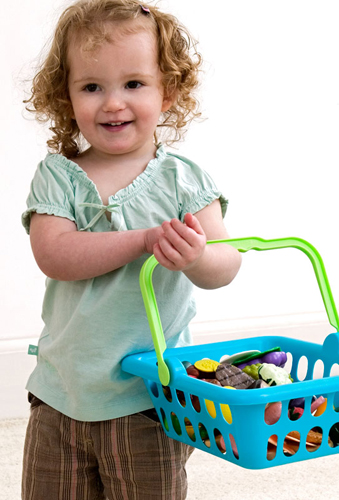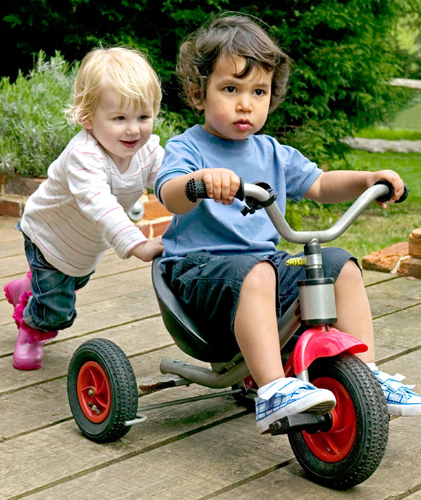Your relationship with your toddler is gradually
changing. He still needs your help for most tasks, and craves your
approval and involvement, but is becoming more independent and
outward-looking and more aware of influences in his life—he remembers
who people are and what they look like.
“You will see more signs of self-awareness as his unique personality and self-expression begin to emerge more strongly.”
During this 12-month
period there will be rapid changes in brain development. Your toddler
will be totally absorbed in developing a new range of skills and, in
particular, trying things out for himself and wanting to be in control.
This inevitably leads to the tantrums, the increase in “Nos,” and the
sometimes challenging behavior typical of two-year-olds as they struggle
with being frustrated and emotionally overwhelmed. Your toddler will be
torn between desperately wanting to do things for himself—such as
getting dressed, making things, being free to move around—and his need
to remain very dependent on you. He is developing the ability to know
what he wants—but knows he cannot yet get there on his own.
Making choices
At this age, children begin to know which toys are their favorites
and which offer comfort. This shows that memory is now playing a role
as they remember having fun and how to play with something.
Let’s pretend
Toys such as plastic food help to bridge the gap between play and
reality and stimulate your child’s imagination, as well as enabling her
to act like Mommy or Daddy.

Dealing with his frustration
As your toddler sees the
world as a bigger and more exciting place, he will want to experience
everything more often, which means he needs greater supervision. He will
want to do more things, but may still be developing the skills required
to do certain tasks. This can lead to frustration and he may, for
example, suddenly throws his toys across the room. Calmly sit with him
and help him achieve what he set out to do, while giving him
instructions and a lot of encouragement. This enables him to achieve
what he set out to do at the same time as acquiring new skills and
developing more positive ways of dealing with frustration.
Imagination and reasoning skills
Over the next two or
three years your child’s imagination will be developing at a rapid rate,
due to the changes that are taking place in his brain.
During this year he will be learning to pretend and will be developing a
growing understanding that an object (such as a toy telephone) can
represent something else (an actual telephone)—provided it at least
looks like the real thing. By the time he is three or four he will have
developed this skill much further and will be able to imagine that
anything from a shoe to a banana might be a phone! But for now, this
vitally important skill means he can start to enjoy and understand
pictures and stories, and later learn about letters and numbers.
Without
imagination and the understanding that one thing can represent or
symbolize another, your toddler would not be able to understand that a
sound can represent a letter of the alphabet; or that numbers represent
things, for example that the number two can represent “two apples” or
“two horses” or two of anything. Nor would he be able to recognize
himself or others in photographs, or appreciate that a cartoon picture
of a cow represents the real thing.
By the time he is 3–4
years old his fantasy world will be well developed; even now, his
ability to imagine and pretend means that the boundaries between his
imaginary world and reality can become blurred and confused from time to
time, as the following example shows:
"“My toddler Ricky had been playing with his 10-year-old cousin,
Mike. Mike kept disappearing briefly behind the sofa, using his voice to
pretend there was a cookie monster there who would come and eat Ricky’s
cookies. To begin with, Ricky thought this was hilarious, and kept
popping behind the sofa to check things out; but when Mike announced in
his monster voice, ‘I’m coming to find the cookies now…’ Ricky’s
imagination suddenly took over, and it all became too much for him. He
ran screaming to find me.”"
Watching your toddler play
can give you a fascinating insight into what is going on in his mind.
At this age, he may often chatter to himself and comment on what is
going on. You will be able to see whether he is acting something out
that is funny, loving, or scary, and whether he is mirroring behavior
that he has seen, as the following example shows:
"“Poppy had a tantrum
one morning because I was giving priority to her baby sister, Rachel.
Poppy had hit Rachel and I told her very firmly that hitting was bad,
and to treat Rachel gently. Later that day I was moved to see her
playing with her doll and saying, ‘No hit little teddy. Hitting bad! Hug
better.’ She then helped her doll to hug her teddy better.”" If your
toddler can use his imagination, it also means that he is developing his
reasoning skills, and will link cause and effect more consistently and
begin to realize that what he does has an influence on what happens
next.
Learning social and emotional skills
Now that your
two-year-old is beginning to understand the impact that he has on the
world around him, he is also starting to become aware that other people
may not see the world in quite the same way.
It is now that your
toddler needs your help to begin to become in tune with his emotions, to
realize that other people have feelings too, and gradually to develop
his social skills. All the effort you are putting in to help him to
manage and name his “big” feelings is helping him to learn and
understand about his emotions. The more he is able to identify and
understand the way he is feeling, the better he will be able to
empathize with other people.
During this period, most
children are able to openly express a wide range of emotions and are
gradually learning to cope with their anxiety if separated from a parent
for a while. This is because your child now has an understanding that
although you have gone, you will also come back. This level of trust and
expectation explains why toddlers hate any change in their routine.
They take comfort in the regularity and predictability of actions and
behaviors. If something does not go as normally expected, the impact can
be very distressing.
Helping your child to learn social and emotional skills:
When you need
to discipline your toddler, make sure you use respectful language and do
not insult or belittle him in any way. This will encourage him to stay
in tune with his feelings.
Comfort
him and help him understand. Children who are able to trust that they
will receive comfort when they are upset, and who are encouraged to
express and understand their feelings, are able to develop compassion
and show empathy toward others from an early age, and grow up to be in
tune with their feelings.
Do
not dismiss his feelings. Children who experience hurt, who are
insulted, or whose sensitive feelings are regularly disregarded, will
learn to cope by gradually shutting themselves off from their emotions.
This behavior can lead to a child developing difficulties in forming
deep friendships or relationships in later life.
Learning to wait
Just as you are
starting to wonder whether your toddler is ever going to learn the art
of waiting, a major shift in his behavior happens. Along with the
development of his reasoning skills comes an understanding that “I can’t
have it now, but I can have it later.” Your patience is now going to
pay off, because your toddler is finally starting to learn self-control.
His ability to pretend means that he has the ability to imagine that
things can happen later. His improved sense of time helps him practice
using more self-control because he knows he will get what he wants
eventually.
You can probably remember
that nighttime seemed to go on forever when you were young.
Long-distance time is a problem for children of this age—an hour is
still an interminable length of time—and “later” may have a different
meaning to him than it does to you. So keep this in mind and help him
learn.
Guidelines for helping your toddler to wait:
Needless to say that in
order for a child to learn to trust in the value of “later,” the adults
who are asking him to wait need to honor their promises and do as they
say, when they said they would. A toddler who discovers that “later” is
code for “never” or “I don’t feel like it” will feel let down and will
be less likely to behave nicely in the future.
Link the time
frame to an event, so that he can understand when the right time has
arrived. “Not now. Later, when your sister is in her crib.”
Use “if, then; when, then” , “If you put your toys in the toy box first, then you can play with your trains.”
If
it is a challenging wait, add an incentive, and show your appreciation:
“I want you to be quiet now, Tony. Can you be quiet until we leave the
store? Good boy. If you can, then you can play soccer with your brother when we get home. Thank you.”
Use
an incentive, such as giving him colored balls, stickers, or building
blocks to collect. Tell him that every five minutes that he can wait and
behave nicely, he will be rewarded with another one.
Waiting his turn
Patience and cooperation are two skills your toddler is gradually
learning and, when he does, he will begin to wait to take turns and
play more harmoniously with others.

Role-play
Your toddler’s ability to
pretend means you can also use role-play to get him used to
understanding how to behave, or to get used to situations that he could
find challenging, such as starting preschool, going to the doctor or
dentist, or coping with someone he finds frightening, such as an
eccentric neighbor. Playing “let’s pretend” helps him to put things in
context.
It’s important not to
mock or trivialize your child’s fears, but trust your judgement to
decide when you might introduce a sense of fun to help normalize the
situation.
For example, if he is very
attached to Grandpa and becomes upset when he has to go home, you can
play “let’s pretend” to help him understand that Grandpa will come back
the next day, and gradually help him to change his mood.
Daddy
“Luke, would you like to pretend to be Grandpa, and shall I pretend to
be you?” In sad voice, (pretending to be his son Luke): “Don’t go,
Gramps. I hate it when you go. I feel very sad and want to cry.”
Luke (pretending to be Grandpa) “Don’t cry. Don’t cry. I come back.”
Daddy, in worried voice “When will you come back, Grandpa? Will you come back tonight and read me a story?”
Luke, firmly “No. Back ’morrow.”
Daddy, sadly “But I feel sad and I don’t want you to go.”
Luke, gently “Don’t be sad.” Strokes Daddy’s head. “Back ’morrow.”
Daddy, gently
“OK, Gramps. I love you.” Gives Luke a hug. “I will try not to be sad
but I miss you when you leave, and sometimes tomorrow seems a very long
time away.” Leaves a short pause… and then changes mood, with silly,
happy voice: “Grandpa?” Gets Luke’s attention and eye contact. “Grandpa,
pleeeeease will you stay?”
Luke, giggly “No, I go now.”
Daddy in more silly voice and giggling “Grandpa, pleeeeeeeeeease will you stay?” Then in a calmer voice, “Will I see you tomorrow then Grandpa?”
Luke, giggly “Yes.” They hug.